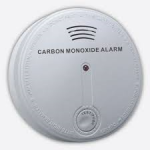Ontario took another step to keep families and homes in Ontario safe by making carbon monoxide alarms mandatory in all residential homes.
The new regulation, which came into effect October 15, 2014, updated Ontario’s Fire Code following the passage of Bill 77 in 2013. Carbon monoxide detectors are now required near all sleeping areas in residential homes and in the service rooms, and adjacent sleeping areas in multi-residential units. Carbon monoxide alarms can be hardwired, battery-operated, or plugged into the wall.
If the house contains at least one fuel-burning appliance (e.g., gas water heater or gas furnace), fireplace, or an attached garage, a CO alarm is required to be installed adjacent to each sleeping area in the house.
CO alarms have been mandatory in new residential buildings containing a fuel-burning or a storage garage since 2001. Until these new amendments, there were no provincial requirements for CO alarms in properties built before 2001. However, many municipalities have required these devices through municipal by-laws.
In rental dwelling units, the landlord of the building is responsible for the installation and maintenance of the CO alarms. The landlord is also responsible for providing the tenant with CO alarm maintenance instructions.
In residential condominium suites, the owner of the condominium suite is responsible for the installation and maintenance of CO alarms in the suite. Often, there are agreements between the owner and the condominium corporation in which the corporation takes on this responsibility on behalf of the owner. In a situation where the condominium owner rents out the suite to a tenant, the owner takes on the role of the landlord and is responsible for the installation and maintenance of the CO alarms. Again, there are often agreements between the owner/landlord and the condominium corporation, in which the corporation takes on this responsibility on behalf of the owner/landlord.
Quick Facts
•More than 50 people die each year from carbon monoxide poisoning in Canada, including 11 on average in Ontario.
•Bill 77, an Act to Proclaim Carbon Monoxide Awareness Week and to amend the Fire Protection and Prevention Act, 1997, received royal assent in December 2013.
•The first Carbon Monoxide Awareness Week will take place November 1-8, 2014.
•The Ontario Building Code requires the installation of carbon monoxide alarms in homes and other residential buildings built after 2001.
The Ottawa Move Team can help you find out what your current home is worth and get you started on the search for your next dream home! Whatever your real estate needs may be, contact Chris and the Ottawa Move Team today.


